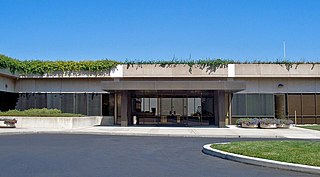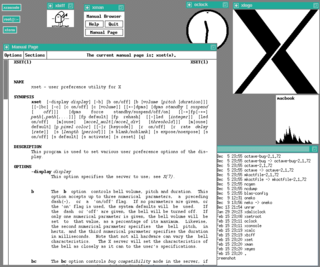Related Research Articles
Microsoft Windows, commonly referred to as Windows, is a group of several proprietary graphical operating system families, all of which are developed and marketed by Microsoft. Each family caters to a certain sector of the computing industry. Active Microsoft Windows families include Windows NT and Windows IoT; these may encompass subfamilies,. Defunct Microsoft Windows families include Windows 9x, Windows Mobile and Windows Phone.
VBScript is an Active Scripting language developed by Microsoft that is modeled on Visual Basic. It allows Microsoft Windows system administrators to generate powerful tools for managing computers with error handling, subroutines, and other advanced programming constructs. It can give the user complete control over many aspects of their computing environment.

PARC is a research and development company in Palo Alto, California. Founded in 1969 by Jacob E. "Jack" Goldman, Xerox Corporation's chief scientist, the company was originally a division of Xerox, tasked with creating computer technology-related products and hardware systems.

Group Policy is a feature of the Microsoft Windows NT family of operating systems that controls the working environment of user accounts and computer accounts. Group Policy provides centralized management and configuration of operating systems, applications, and users' settings in an Active Directory environment. A set of Group Policy configurations is called a Group Policy Object (GPO). A version of Group Policy called Local Group Policy allows Group Policy Object management without Active Directory on standalone computers.
KiXtart is a closed source free-format scripting language for Windows. It is described as a logon script processor and enhanced batch scripting language by the official website. Its name is a portmanteau of "kick start".
Remote administration refers to any method of controlling a computer from a remote location. Software that allows remote administration is becoming increasingly common and is often used when it is difficult or impractical to be physically near a system in order to use it. A remote location may refer to a computer in the next room or one on the other side of the world. It may also refer to both legal and illegal remote administration.
Microsoft Servers is a discontinued brand that encompasses Microsoft software products for server computers. This includes the Windows Server editions of the Microsoft Windows operating system, as well as products targeted at the wider business market. Microsoft has since replaced this brand with Microsoft Azure, Microsoft 365 and Windows 365.

In computing, a shell is a computer program which exposes an operating system's services to a human user or other program. In general, operating system shells use either a command-line interface (CLI) or graphical user interface (GUI), depending on a computer's role and particular operation. It is named a shell because it is the outermost layer around the operating system.

Windows Vista is a major release of the Windows NT operating system developed by Microsoft. It was the direct successor to Windows XP, which was released five years prior, at the time being the longest time span between successive releases of Microsoft Windows desktop operating systems. Development was completed on November 8, 2006, and over the following three months, it was released in stages to computer hardware and software manufacturers, business customers and retail channels. On 8 November 2006, it was released internationally and was made available for purchase and download from the Windows Marketplace; it is the first release of Windows to be made available through a digital distribution platform.

User Account Control (UAC) is a mandatory access control enforcement feature introduced with Microsoft's Windows Vista and Windows Server 2008 operating systems, with a more relaxed version also present in Windows 7, Windows Server 2008 R2, Windows 8, Windows Server 2012, Windows 8.1, Windows Server 2012 R2, and Windows 10. It aims to improve the security of Microsoft Windows by limiting application software to standard user privileges until an administrator authorizes an increase or elevation. In this way, only applications trusted by the user may receive administrative privileges, and malware should be kept from compromising the operating system. In other words, a user account may have administrator privileges assigned to it, but applications that the user runs do not inherit those privileges unless they are approved beforehand or the user explicitly authorizes it.

Quick Assist is a Microsoft Windows feature that allows a user to view or control a remote Windows computer over a network or the Internet to resolve issues without directly touching the unit. It is based on the Remote Desktop Protocol (RDP). It is complemented by Get Help, a feature introduced in Windows 10 that enables the user to contact Microsoft directly but does not allow for remote desktoping or screen sharing.
Resource Kit is a term used by Microsoft for a set of software resources and documentation released for their software products, but which is not part of that product. Resource kits offer supplementary resources such as technical guidance, compatibility and troubleshooting information, management, support, maintenance and deployment guides and multipurpose useful administrative utilities, which are available separately.
Windows Vista contains a range of new technologies and features that are intended to help network administrators and power users better manage their systems. Notable changes include a complete replacement of both the Windows Setup and the Windows startup processes, completely rewritten deployment mechanisms, new diagnostic and health monitoring tools such as random access memory diagnostic program, support for per-application Remote Desktop sessions, a completely new Task Scheduler, and a range of new Group Policy settings covering many of the features new to Windows Vista. Subsystem for UNIX Applications, which provides a POSIX-compatible environment is also introduced.
Microsoft Application Virtualization is an application virtualization and application streaming solution from Microsoft. It was originally developed by Softricity, a company based in Boston, Massachusetts, acquired by Microsoft on July 17, 2006. App-V represents Microsoft's entry to the application virtualization market, alongside their other virtualization technologies such as Hyper-V, Microsoft User Environment Virtualization (UE-V), Remote Desktop Services, and System Center Virtual Machine Manager.
Microsoft Desktop Optimization Pack (MDOP) is a suite of utilities for Microsoft Windows customers who have subscribed to Microsoft Software Assurance program. It aims at bringing easier manageability and monitoring of enterprise desktops, emergency recovery, desktop virtualization and application virtualization.
A standard operating environment (SOE) is a standard implementation of an operating system and its associated software. Associated names and concepts include:
Microsoft Deployment Toolkit is a free software package from Microsoft for automating the deployment of Windows 10, Server 2019 and older windows server and desktop operating systems.

Micro Focus ZENworks, a suite of software products developed and maintained by Micro Focus International for computer systems management, aims to manage the entire life cycle of servers, of desktop PCs, of laptops, and of handheld devices such as Android and iOS Mobile Phones and Tablets. As of 2011 Novell planned to include full disk encryption functionality within ZENworks. ZENworks supports multiple server platforms and multiple directory services.
FastTrack Automation Studio – often referred to as just FastTrack – is a scripting language for Windows IT System Administrators. The product’s goal is to handle any kind of scripting that might be required to automate processes with Microsoft Windows networks. The web site of the product is located at www.fasttrackscript.com.
Goverlan Reach Systems Management is a remote support software created and distributed by Goverlan, Inc. Goverlan is an on-premises client management software designed for medium to large enterprises for remote control, active directory management, global configuration change management, and reporting within a Windows IT Infrastructure.
References
- Kelly, Bob. Start to Finish Guide to Scripting with KiXtart / Bob Kelly. Greenland, NH : Agility Press, 2004. ISBN 1-932577-09-2
- Kelly, Bob. The Definitive Guide To Windows Desktop Administration / Bob Kelly. San Francisco, CA : Realtimepublishers, 2004. eBook
- Kelly, Bob. "Deploying and Administering Windows Vista Bible" /Bob Kelly. Wiley ISBN 0-470-18021-8